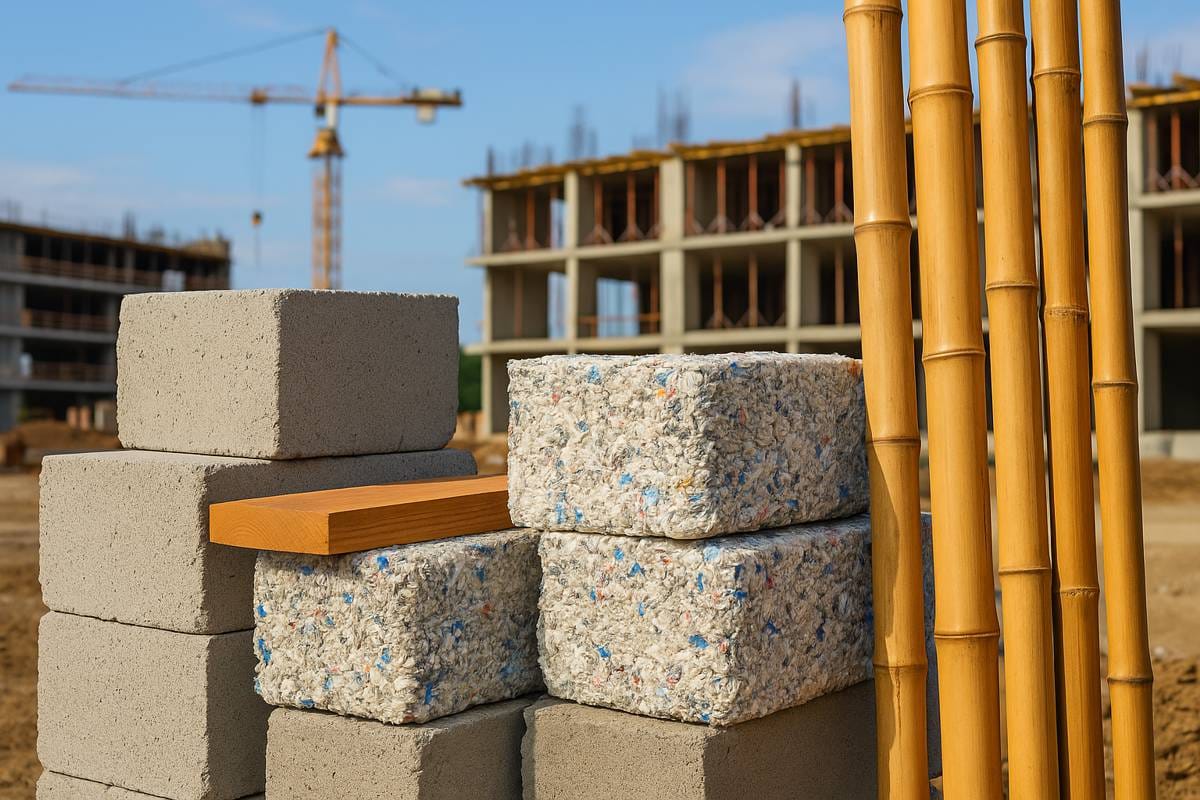A Greener Future in Construction
In the face of climate change and rising carbon emissions, the construction industry is undergoing a green transformation. Cities like Siliguri, where rapid urban growth meets the fragile ecology of the Himalayan foothills, are beginning to embrace carbon-neutral building materials. As civil engineering consultants and green construction specialists push for innovation, sustainable materials such as geopolymer concrete, bamboo, and recycled plastics are gaining momentum as powerful alternatives to traditional, carbon-intensive options.
Whether you’re a builder, architect, homeowner, or sustainability enthusiast, understanding these emerging materials is key to contributing to carbon footprint reduction in construction while maintaining design and structural integrity.
What Are Carbon-Neutral Building Materials?
Carbon-neutral building materials refer to construction substances that either produce no net carbon emissions or are capable of sequestering more carbon than they emit during their lifecycle. They align with zero-emission construction methods and circular economy in construction by promoting longevity, recyclability, and minimal energy usage.
Geopolymer Concrete: The Low-Carbon Cement Alternative
Geopolymer concrete is a revolutionary material derived from fly ash, slag, or other industrial by-products instead of limestone. Unlike traditional Portland cement, geopolymer concrete emits up to 80% less CO2 during production.
Fly Ash-Based Geopolymer Concrete vs Traditional Concrete
| Feature | Geopolymer Concrete | Traditional Concrete |
| Binder | Fly ash / slag | Portland cement |
| CO2 Emissions | Low | High |
| Heat Resistance | Excellent | Moderate |
| Durability | High | Standard |
| Cost in India | Competitive | Rising |
Geopolymer concrete in India is being rapidly adopted in both green building materials India initiatives and sustainable civil engineering practices. With Siliguri’s proximity to power plants, fly ash-based geopolymer concrete offers a cost-effective, sustainable local solution.
Read also: How 3D Elevation & Interior Visualization Can Save You Money
Bamboo: Nature’s Strongest and Most Versatile Material
Bamboo construction material in Siliguri is gaining traction not just for its strength and aesthetic value, but also for its eco-friendliness. Bamboo is fast-growing, biodegradable, and absorbs more CO2 than most trees.
Benefits of Bamboo in Architecture
- High strength-to-weight ratio
- Biodegradable building components
- Naturally pest-resistant
- Rapid renewability (harvestable in 3–5 years)
- Affordable eco-friendly house materials
Given Siliguri’s subtropical climate, bamboo also offers excellent thermal insulation, making it ideal for environment-friendly house building in the region.
Recycled Plastics: Turning Waste into Strong Infrastructure
Plastic waste, once a menace, is now being re-engineered into powerful building blocks. From plastic waste in road and home construction to recyclable materials for green infrastructure, this innovation contributes to the circular economy in construction.
Uses of Recycled Plastics in Construction:
- Paver blocks and tiles
- Plastic bricks for walls
- Composite panels for cladding and roofing
- Insulating materials
As per recent developments, several Siliguri-based sustainable building experts are already piloting recycled plastic in cost-effective modular housing.
Read also: 10 Simple House Map Designs for Your Dream Home
Why Siliguri Is Ready for Green Building Materials
Siliguri is uniquely positioned at the crossroads of development and ecology. The city’s builders are looking for eco-friendly construction solutions that are both practical and forward-thinking.
Sustainable Construction Materials Siliguri Needs:
- Thermal efficiency due to diverse climates
- Affordability for semi-urban housing
- Low carbon construction techniques to reduce the environmental toll
- Sustainable design consultancy in West Bengal to drive adoption
Conclusion: Build Smart, Build Sustainable
From green construction consultancy Siliguri to innovative building materials for climate change, the path forward is clear: sustainability is no longer an option; it’s a necessity. At Elite Blueprints Consultancy, we help clients choose materials and methods that ensure strength, style, and a lighter environmental footprint.
Looking to build the eco-friendly home of your dreams? Reach out to Elite Blueprints Consultancy — your trusted partner for carbon-neutral building solutions in Siliguri.
📞 Call Us Today: +91-82500 86323, +91-90462 50581
🌐 Visit: www.ebcsiliguri.com
📍 Based in Siliguri | Serving India
FAQs About Eco-Friendly Materials in Construction
Q1: Are these materials more expensive than traditional ones?
Not always. Materials like bamboo and fly ash-based concrete are affordable eco-friendly house materials in Siliguri due to local availability and lower long-term costs.
Q2: Are these materials durable?
Yes. Geopolymer concrete has excellent chemical and thermal resistance. Recycled plastic panels and bamboo structures, when treated, can last decades.
Q3: Can I use these materials in both interiors and exteriors?
Absolutely. Bamboo works wonderfully for both. Recycled plastic is ideal for outdoor uses, while geopolymer concrete is perfect for structural foundations.
Read also: Green Building Techniques We Use in 2025: Sustainable Yet Affordable




Comments are closed